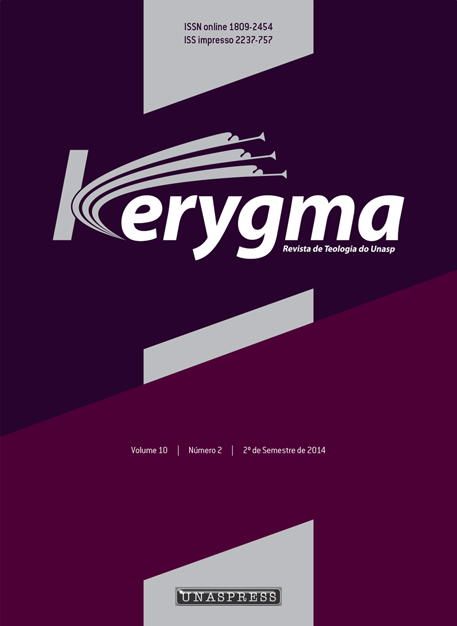UMA ANÁLISE EPISTEMOLÓGICA DA CONSCIÊNCIA RELIGIOSA INTERSUBJETIVA
Abstract
Grande parte da vida sociorreligiosa que os cristãos exteriorizam e objetivam ao interagir com Deus através da adoração congregacional requer uma análise interpretativa. O sentido religioso que o cristão encontra no ritual de adoração, baseado na consciência religiosa intersubjetiva bíblica da relação dialógica Deus-homem, permite avançar na compreensão da formação e conservação de fé, isto é, na construção e atualização de uma consciência religiosa intersubjetiva. Para isso, o presente artigo usa o método teológico de Bernard Lonergan e os quatro níveis de consciência (empírico, intelectual, racional e responsável), conectado com o modelo pastoral de ver, julgar e agir; e com os três tipos ideais de Jürgen Habermas sobre o perfil ético-professional do cientista social (técnico, prático e dialógico).
Palavras-chave: Consciência Religiosa Intersubjetiva; Níveis de Consciência; Consciência Bíblica.
Abstract: Much of the socio-religious life that Christians externalized and are intended to interact with God through congregational worship requires an interpretative analysis. The religious sense that the Christian finds in ritual worship, based on the biblical religious consciousness of intersubjective dialogic relationship God-man, up through the understanding of the formation and preservation of faith, that is, in building and updating an inter-subjective religious consciousness. In order to do this, the present article uses the theological method of Bernard Lonergan and the four levels of consciousness (empirical, intellectual, rational and responsible), connected with the pastoral model to see, judge and act; and the three ideal types of Jürgen Habermas on the ethical and professional profile of the social scientist (technical, practical and dialogical).
Keywords: Religious inter-subjective consciousness; Awareness levels; Biblical consciousness.
Downloads
References
AUSTIN MILLÁN, T. Dos momentos en la teoría de Jurgen Habermas, 2000. Disponível em: http://bit.ly/ZWZRSu.
BERGER, P.; LUCKMANN, T. La construcción social de la realidad. Buenos Aires: Amorrortu editores, 1999.
GEERTZ, C. La interpretación de las culturas. Barcelona: Editorial Gedisa, 2005.
HABERMAS, J. Teoría de la Acción Comunicativa. Madrid: Taurus, 1987.
MARZAL, M. Tierra encantada. Tratado de antropología religiosa de América Latina. Lima: Editorial Trota, 2002.
RICOEUR, P. El mal. Un desafío a la filosofía y a la teologia. Buenos Aires: Amorrortu editores, 2007.
RITZER, G. Teoría sociológica contemporânea. Madrid: McGraw-Hill, 1993.
SCANNONE, J. C. Religión y nuevo pensamento: hacia una filosofía de la religión para nuestro tiempo desde América Latina. Barcelona: Anthropos Editorial, 2005.
Published
How to Cite
Issue
Section
License
Copyright Statement
In summary, authors who publish in Kerygma must agree that:
-
Once accepted for publication, the copyright of the articles is transferred to Kerygma.
-
All third-party materials used in the text must be properly referenced.
-
Authors must hold the rights or permissions for the use of images, tables, and other graphic materials.
-
Authors guarantee that the submitted manuscript is original, of their own authorship, and has not been submitted or published elsewhere.
-
The opinions and ideas expressed in the texts are the sole responsibility of the authors and do not necessarily reflect the views of the journal.
-
The editors reserve the right to make textual revisions and adjustments in accordance with the journal’s editorial standards.
-
Authors retain copyright and grant the journal the right of first publication, with the work licensed under the Creative Commons Attribution–NonCommercial 4.0 International License.
-
Authors authorize the reproduction and adaptation of the material by Kerygma, with the authors’ participation or express authorization when required.
-
The journal may distribute, store, archive, and make the articles available through any physical or digital means, whether free of charge or paid.
-
Authors may enter into separate agreements for the non-exclusive distribution of the published version of the work, provided that the original publication in Kerygma is acknowledged.
-
Full or partial reproduction of the texts in other publications requires prior written authorization from the editor.
-
Authors are permitted and encouraged to publish and distribute their work online (e.g., in institutional repositories or personal webpages) before or during the editorial process, as this may increase the visibility and citation impact of the published work.










